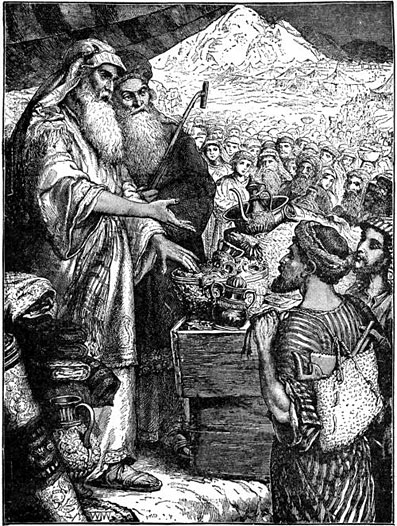Aug
14
2009
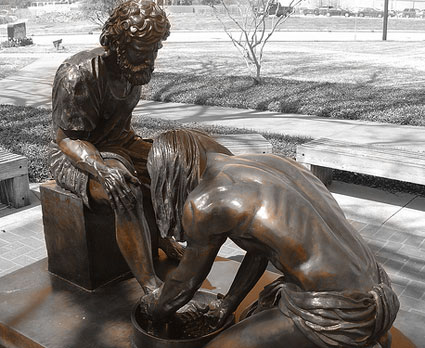
or Filling Up That Which is Lacking
After reading about the Bible’s use of robes as symbols of office (see The Dominion Trap by James B. Jordan), Tim Mitchell commented:
In Bible study we’ve been looking at John, so a few weeks ago was John 13. My Bible translated v.4-5 as “So he got up from the table, took off his robe, wrapped a towel around his waist, and poured water into a basin. Then he began to wash the disciples’ feel, drying them with the towel he had around him.”
So that recalled for me the couple of pages on robe imagery, and it seems to foreshadow what Jesus will do later on very well: He is willing to take off his authority and righteousness, and take on the dirt of our sin.
But then I got a bit unsure, since Jesus then goes on to say “you ought to wash each others’ feet” in v.14 and “Do as I have done to you” in v.15. So if the symbolism applies, how are we also supposed to take other peoples’ sin on us as Jesus did?
Firstly, what a great question. Many New Testament passages become so familiar that we often lose the ability to really think about their ramifications.
The structure of the Last Supper puts this action of Jesus at Atonement, the Laver (Day 6). Jesus is liturgically pre-enacting His role as High Priest. The Adam removed his glorious robes and wore linen for the Day of Covering. Jesus left this in the tomb with our sin on it. But that is not all the High Priest did. He approached the Most Holy twice.
Continue reading
Comments Off | tags: AD70, Against Hyperpreterism, Ahasuerus, Atonement, Daniel, Esther, Hebrews, High Priest, Holy Place, Joseph, Last Supper, Liturgy, Totus Christus | posted in Biblical Theology, Christian Life, Totus Christus
Jul
14
2009
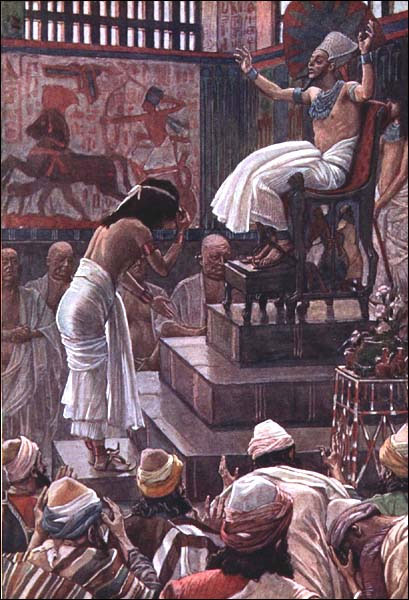
or Theonomy in the Bible
“…instead of Moses and Aaron challenging the powers that be, we have Herodian preachers crying “Peace, peace” when there is no peace. Nathan is not qualified to confront David because Nathan himself has been sleeping around.”
In his post Christianity as Comprehensive Cultural Tribunal?, timsmartt questions the validity of philosophy’s self-appointed role as an unbiased cultural referee and wonders whether Christianity should take that role:
Continue reading
Comments Off | tags: Aaron, Abraham, Against Hyperpreterism, antichrist, Daniel, Esther, Herod, Jethro, John the Baptist, Korah, Melchizedek, Mordecai, Moses, Nathan, Philosophy, Postmillennialism, Solomon | posted in Biblical Theology, The Last Days, The Restoration Era
Jul
3
2009
“Be meticulous to present yourself for the praise of God as an unashamed workman, cutting the word of truth in a straight line.” (II Timothy 2:15)
Is this verse simply teaching that if we “divide up” the Scriptures correctly, we’ll get an AWANA[1] merit badge from God? Hardly. It is flanked by condemnations of those who fight over the Scriptures to no profit, and those whose vain babblings are gangrenous.
Paul speaks of a soldier and a farmer, and then a productive workman. Paul is concerned about building saints and churches, and they are built by a straight and true cutting of the word. Like most of Paul’s statements, there is a very long, fully-loaded freight train of Old Testament history and typology right behind it, and it’s coming right at you, right now.
Continue reading
Comments Off | tags: Darius, David, Esther, Ezekiel's Temple, Nebuchadnezzar, New Jerusalem, oikoumene, Peter, Peter Leithart, Postmillennialism, Revelation, Solomon, Stigmata, Temple, Totus Christus, Worship | posted in Biblical Theology, Christian Life, The Last Days, The Restoration Era
Jun
29
2009
James Jordan’s work on the Jew-Gentile oikoumene set up in Daniel has far reaching implications.1 Peter Leithart writes:
“Yoder argues that from the time of the Babylonian captivity, the Jews developed a proto-”free church” model of community life. True in some respects. Jews didn’t have their own polity. But I’ve got doubts if that’s a fair characterization of Jews in and after the exile.
Continue reading
Comments Off | tags: AD70, Archaeology, Daniel, Esther, Exile, Hellenism, Mordecai, Nehemiah, oikoumene, Peter Leithart, Tertullian, Yoder | posted in Biblical Theology, Quotes, The Last Days, The Restoration Era
Jun
15
2009
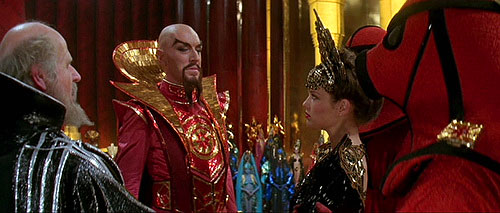
One major difference between Jordan and other preterists is his identification of Paul’s “man of sin.” Jordan is correct in naming the Herods rather than Nero because he understands biblical typology better.
Continue reading
2 comments | tags: Belshazzar, cherubim, Daniel, Esther, Film, Herod, James, James Jordan, Joseph, Mordecai, Nero | posted in Biblical Theology, The Last Days, The Restoration Era
Jun
8
2009
or Touch Not, Taste Not, Handle Not II
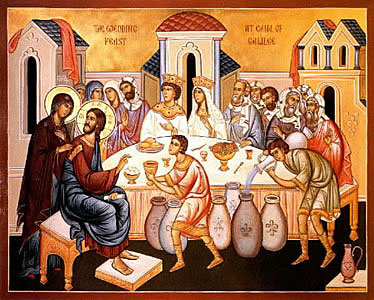
The dietary Laws given to Moses were an expansion of the command given to Adam. It is the self-denial of priestly obedience to God. Adam wasn’t ready for the tree of judicial responsibility (kingdom) but he seized it.
In the greater Bible picture, Israel’s history (from Moses) is this period of priestly obedience. But Jesus came and reversed Adam’s failure. Consequently the dietary laws are revoked, and with greater maturity, the people of God (through the first century death of Israel and her resurrection as the church) now, like Jesus, have the judicial wisdom of the Spirit, and the power to eat unclean things (Gentiles), consume them and make them clean. Only the power of resurrection can enter a room with a corpse in it, touch lepers and feast on Gentile meats and not be made unclean, but instead make the unclean clean by consuming it. This is the power of the New Covenant.
Continue reading
Comments Off | tags: Babylon, Crystal Sea, Daniel, Esther, Food laws, Postmillennialism, Priesthood, Resurrection, Scavengers, Tabernacle | posted in Biblical Theology
May
12
2009
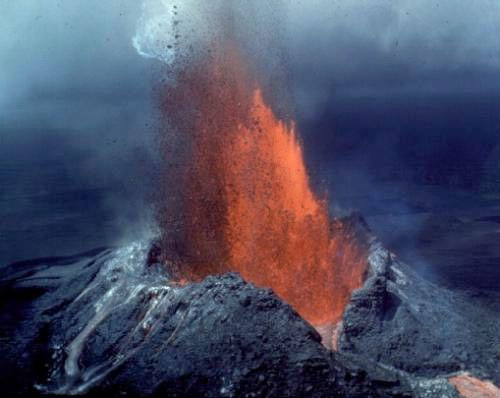
“And in that day His feet will stand on the Mount of Olives, which faces Jerusalem on the east. And the Mount of Olives shall be split in two, from east to west, making a very large valley; Half of the mountain shall move toward the north and half of it toward the south.” Zechariah 14:4
Surprising as His ways are, the Lord always follows procedure. Like Ahasuerus in the book of Esther, anything that is done is done by decree. Although, in the case of Ahasuerus, he needed to consult his elders, whereas God only consults his maturing elders (like Abraham and David–and now the church) to bring us to greater maturity.
A decree is written in the Most Holy, the king’s garden court (head). The elders in the Holy Place respond with liturgy (body). And then they ride out into the world on the swiftest horses to incite a Holy War that divides the world to bring about a New Creation.
Continue reading
Comments Off | tags: AD70, Ahasuerus, David, Esther, Greek philosophy, Liturgy, Numbers 5, Remnant, Restoration, Solomon, Temple, Zechariah | posted in Biblical Theology, The Last Days, The Restoration Era
Apr
28
2009
or How Modern Conservative Theologians Unwittingly Use Literary Genres to Mask Their Unbelief
One of the big problems with modern theology is its habit of categorising parts of the Bible into literary genres. For sure, the Bible contains historical prose, visions, poetry and songs. But many passages won’t actually fit into these neat little pigeon holes without hamstringing their intended purpose. And as it turns out, these “genre-lisations” are excuses to compromise with humanistic pop-philosophy and pop-history.
The three main gripes I have are misuses of the genres poetry, polemic and apocalyptic.
Continue reading
1 comment | tags: Apocalyptic, Daniel, David Field, Esther, Ezekiel, Gnosticism, Ideology, James Jordan, John Dickson, Peter Leithart, Restoration, Revelation, Rowan Williams | posted in Biblical Theology, Creation, The Last Days, The Restoration Era
Apr
18
2009
or A Marriage Made in…
The Bible is big on mediators. Adam’s role as faithful Showbread would link heaven and earth. He would be a god-man. Fulfilled by Christ, this is the liturgical role of a minister. He faces God as representative of the Bride, and faces the church as the representative of the Bridegroom. He is Solomon at the completion of the Temple dedication.
The ‘hell’ hybrids are the Land-beasts of the Bible. This is what Adam became, conspiring with Satan. It was an unholy alliance between God’s mediator and the Creation, in which the Creation called the agenda. The resulting peoples are hunters like Nimrod and Esau, wolves instead of shepherds, bloodthirsty children of the daughters of men.
Continue reading
Comments Off | tags: 666, AD70, Adam, Boaz, Compromise, Crystal Sea, Dominion Theology, Esther, Herod, Intermarriage, Joseph, Nero, Nimrod, Paul, Pilate, Revelation, Solomon, Table of Showbread, Temple, Totus Christus, Wormwood | posted in Biblical Theology, The Last Days
Apr
16
2009
“There were hangings of fine white and violet linen held by cords of fine purple linen on silver rings and marble columns, and couches of gold and silver on a mosaic pavement of porphyry, marble, mother-of-pearl and precious stones.” Esther 1:6 [NASB]
In his Esther lectures, James Jordan observes that Ahasuerus is pictured as being enthroned over his very own crystal sea.
Nero was the first ruler in history to be buried in porphyry. For this ‘bad Ahasuerus’ who exercised false judgment, the crystal sea became a laver of fire. We know from Revelation 14:10 that the lake was before the heavenly throne.
“Then the beast was captured, and with him the false prophet who worked signs in his presence, by which he deceived those who received the mark of the beast and those who worshipped his image. These two were cast alive into the lake of fire burning with brimstone.” Revelation 19:20
Herod’s Temple was covered in marble. Revelation shows it replaced with a crystal city. The church is now the Laver. Baptism symbolises the gospel as walls to the wicked and gates to the righteous: fire and ice. Jesus’ kingdom is the fifth empire and His judgment is righteous and uncompromising.
“So then, because you are lukewarm, and neither cold nor hot, I will vomit you out of My mouth” Revelation 3:16
It might look like I’m colouring outside the lines, but it’s in line with a very consistent Biblical symbolism.
Comments Off | tags: Baptism, Crystal Sea, Esther, James Jordan, Nero, Revelation | posted in Biblical Theology, The Last Days



